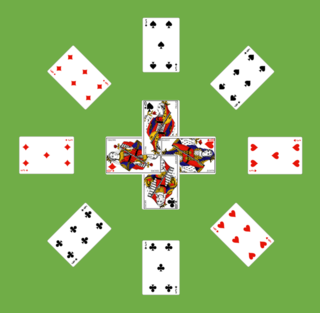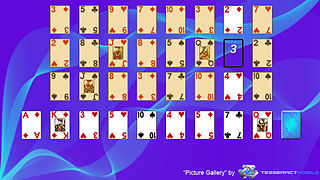Related Research Articles

Napoleon at St Helena is a 2-deck patience or solitaire card game for one player. It is quite difficult to win, and luck-of-the-draw is a significant factor. The Emperor Napoleon often played patience during his final exile to the island of St Helena, and this is said to be the version he probably played. Along with its variants, it is one of the most popular two-deck patiences or solitaires. The winning chances have been estimated as 1 in 10 games, with success typically dependent on the player's ability to clear one or more columns. The game is the progenitor of a large family of similar games, mostly with variations designed to make it easier to get out.

Agnes is a patience or solitaire card game that emerged in England about the same time as Klondike appeared in the US. The classic version has the unusual feature of packing in colour, a feature it shares with Whitehead. By contrast, the later American variant appears to have been influenced by Klondike with packing is in alternate colours. The classic game has been described as the best single-pack patience yet invented.

Quadrille is the name of two loosely related card games of the Patience or solitaire type which are often confused. Both use a pack of 52 playing cards. The earlier one was also known as La Française or Royal Quadrille, the slightly later one as Captive Queens. The name is derived from the desired outcome of the earlier game in which the four Kings and Queens are arranged in a square formation as in the European dance of quadrille that was fashionable in the 18th and 19th centuries.
Beleaguered Castle is a patience or solitaire card game played with a deck of 52 playing cards. It is sometimes described as "Freecell without cells" because its game play is somewhat akin to the popular solitaire computer game of that name but without extra empty spaces to maneuver. Beleaguered Castle is also called Laying Siege and Sham Battle.
Salic Law is a solitaire card game using two decks of 52 playing cards each. It is named after the Salic Law which prohibits women from ascending to the throne or obtaining inheritance.
British Square is a patience or solitaire card game which uses two decks of 52 playing cards each. It is a fan-type game in the style of La Belle Lucie. It has an unusual feature of switchback building whereby each foundation is first built up and then built down.
Sir Tommy, also called Old Patience, is a patience or solitaire card game using a single pack of 52 playing cards. It is said to be the ancestor of all patiences, hence its alternative title. It is a half-open, planner type of patience game in the same family of card-building games as Calculation and Strategy. It is also known as Try Again and Numerica. Ednah Cheney (1869) calls it Solitaire and says "it is the simplest form of patience".
Crescent is a solitaire card game played with two decks of playing cards mixed together. The game is so called because when the cards are dealt properly, the resulting piles should form a large arc or a crescent. An alternative and less common name for the game is La Demi-Lune.
Tournament is a patience or solitaire card game which uses two decks of playing cards shuffled together. It is a variant of the much older game of Napoleon's Flank or Nivernaise and was first known as Maréchal Saxe.

Baroness is a patience or card solitaire that is played with a single deck of 52 playing cards. It is similar to other members of the Simple Addition family and is also distantly related to Aces Up.
Duchess or Glenwood is a patience or solitaire card game which uses a deck of 52 playing cards. It has all four typical features of a traditional patience or solitaire game: a tableau, a reserve, a stock or talon and a wastepile. It is relatively easy to get out. It is a reserved packer, the same type of game as Canfield or Demon. Arnold describes it as "an interesting game with a fair chance of a favourable outcome."
Westcliff is the name of two closely related patience or card solitaire games of the simple packer type, both of which are played using a deck of 52 playing cards. One version is particularly easy to win, with odds of 9 in 10; the other is harder with odds closer to 1 in 4. The game has a variant, Easthaven.

Queen's Audience, sometimes known as King's Audience, is a pictorial patience or solitaire card game which uses a single pack of 52 playing cards. It is so named because the Jacks and their 'entourage' end up adjacent to their respective Queens as if having an audience with them.
Deuces or Twos is a patience or card solitaire game of English origin which is played with two packs of playing cards. It is so called because each foundation starts with a Deuce, or Two. It belongs to a family of card games that includes Busy Aces, which is derived in turn from Napoleon at St Helena.
Amazons is an old patience or card solitaire game which is played with a single deck of playing cards. The game is played with a Piquet pack minus the kings or a standard 52-card pack that has its twos, threes, fours, fives, sixes, and kings removed. This game is named after the female-led tribe, the Amazons, because the queen is the highest card, and all queens are displayed if the game is won.
Duchess of Luynes is a patience or card solitaire game played with two packs of playing cards. It is a member of the Sir Tommy family. A unique feature of this game is the building of the reserve, which is not used until the entire stock runs out.

Four Seasons is a patience or card solitaire which is played with a single deck of playing cards. It is also known as Corner Card and Vanishing Cross, due to the arrangement of the foundations and the tableau respectively. Another alternate name is Cross Currents.
British Constitution is an English patience or card solitaire played with two packs of playing cards. It is a card game with a high chance in winning.

Fortune's Favor or Fortune's Favour is a patience or card solitaire which is played with a deck of 52 playing cards. It is so-called probably because the chances of winning are completely on the player's side. It is a significantly simplified version of the game Busy Aces, a member of the Forty Thieves family of solitaire games.

Royal Parade is an old, English, two-pack patience of the half-open builder type. The object of the game is to move cards to the foundations to create a 'gallery' full of picture cards.
